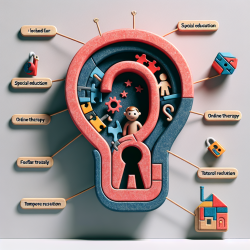As a practitioner working with children who have auditory challenges, understanding the impact of Otitis Media with Effusion (OME) on temporal resolution is crucial. The research article "Auditory Deprivation in Children with Otitis Media with Effusion and its Effect on Temporal Resolution" by Johnston and Green provides valuable insights into this issue.
Otitis Media with Effusion is a common auditory condition in children, with a high incidence rate. Approximately 75% of children experience at least one episode before their third birthday. Chronic OME, which affects around 20% of children, can lead to significant auditory deprivation, impacting a child's auditory and language development.
The study conducted by Johnston and Green explored whether children with a history of chronic OME exhibit long-term deficits in temporal processing. Temporal processing is essential for understanding auditory events over time, such as distinguishing between different speech sounds in noisy environments.
In their research, Johnston and Green compared the performance of two groups of six- and seven-year-old children on tasks involving word recognition in interrupted and continuous noise. One group had a history of chronic OME, while the control group had minimal exposure to the condition. The results indicated no significant difference between the two groups in their ability to process temporal information.
Despite these findings, it is essential for practitioners to remain vigilant. While the study did not find long-term temporal processing deficits, other research has shown that children with a history of OME may still face challenges in complex auditory tasks, such as speech recognition in noisy environments.
As a practitioner, consider the following strategies to support children with a history of OME:
- Conduct regular auditory assessments to monitor any changes in hearing sensitivity and temporal processing abilities.
- Implement auditory training programs that focus on improving temporal resolution and speech perception in noise.
- Encourage the use of assistive listening devices in classroom settings to enhance the signal-to-noise ratio.
- Collaborate with audiologists and speech-language pathologists to develop comprehensive intervention plans.
Furthermore, practitioners should stay informed about the latest research in the field of auditory processing and OME. Attending conferences, participating in webinars, and reading relevant publications can provide valuable insights and help improve intervention strategies.
To read the original research paper, please follow this link: Auditory Deprivation in Children with Otitis Media with Effusion and its Effect on Temporal Resolution.










